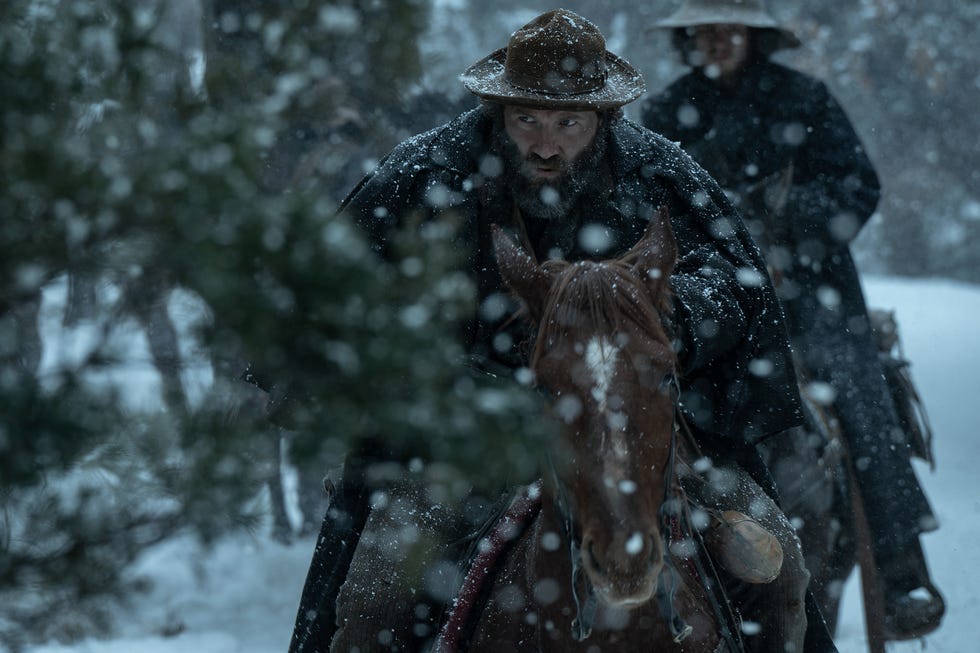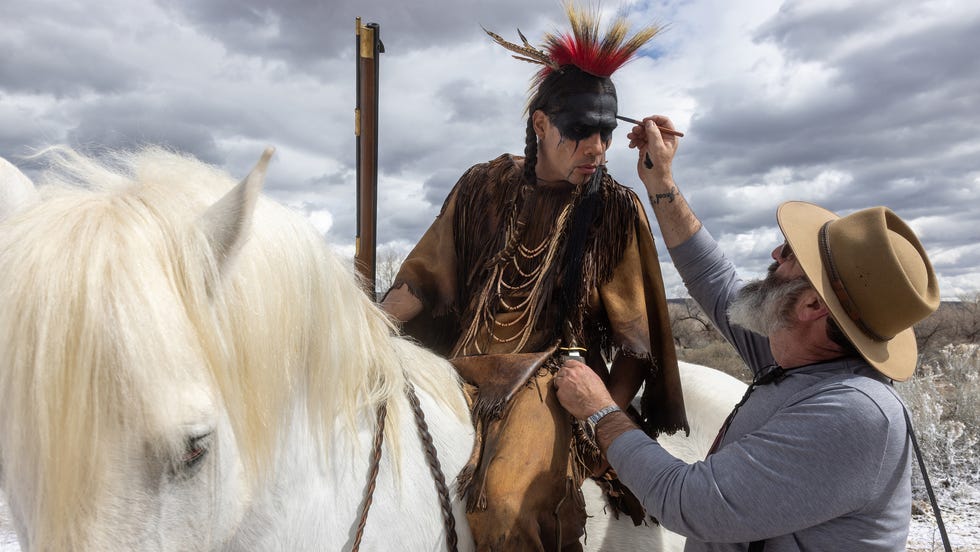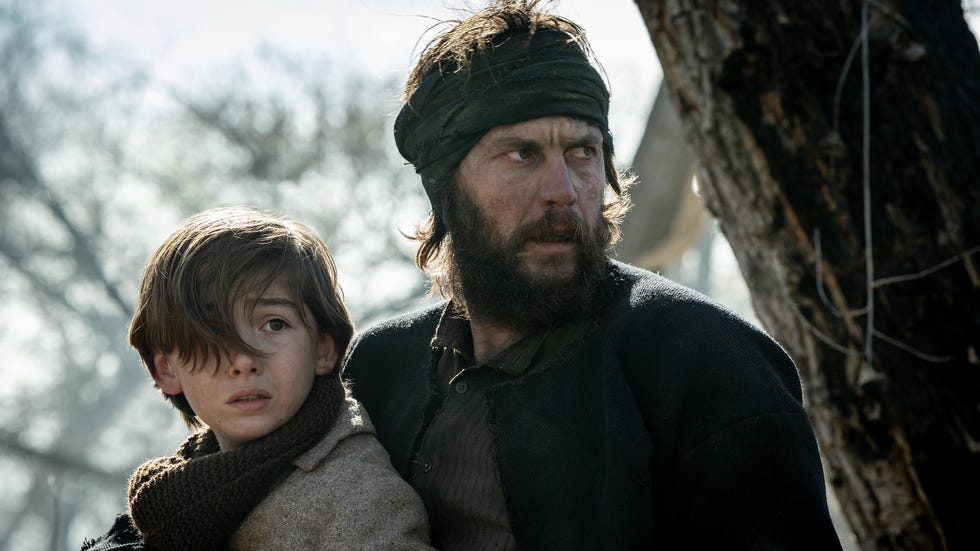Peter Berg Sounds Off on the 'Friday Night Lights' Reboot, Taylor Sheridan, and 'American Primeval'

Filming a Western is a grueling experience. As American Primeval director Peter Berg recalls, production took roughly 130 days in the mountains of Sante Fe, New Mexico, through snowstorms, heat waves, and rattlesnakes. So before the 61-year-old filmmaker put a team together to shoot the Netflix limited series set in 1850s Utah, he knew he needed people that identified as outdoorsmen first, and TV crew second. The result? One of the most realistic and violent portrayals of the American West that has ever aired on screen.
“Usually, the first questions I would ask them were, ‘How's your body? Are you in shape? How's your back? How are your knees? How are your hips?’ And they'd be like, ‘What?’” Berg tells me about his interview process over Zoom.
“I can think of five crew members who all lost at least 25 pounds on the shoot and ended up looking ten years younger when it was over. They were like, ‘This is the best thing that ever happened to me,’ Berg says. “It's a different type of work. Some films take place in sound stages, where it's very controlled, and that's fine. This was not that. This was an American adventure for the crew as well.”
American Primeval follows a woman named Sara Holloway (Betty Gilpin), who is a fugitive on the run after murdering her abusive husband. With her young son in tow, she seeks the help of a mountain man named Isaac Reed (Taylor Kitsch) to help guide them through the lawless West to California. But it’s a rough time to trek through the Utah territory. Based on true events, violent battles between the Native Americans, the American settlers, and the Church of Jesus Christ of Latter-day Saints in 1857 lead to the horrific Mountain Meadows Massacre.
Mark L. Smith (The Revenant screenwriter) created and wrote the limited series alongside Peter Berg, which ran for six episodes on Netflix this past January. Before Primeval, Berg helmed Friday Night Lights with Primeval's Taylor Kitsch, directed the Sackler family miniseries Painkiller with Matthew Broderick, and helped produce two Taylor Sheridan films. As we head toward Emmy season later this summer, Berg and co. are simply thankful for the 25 million views and counting, according to the streamer.
“You just absolutely never know,” Berg says. “We had a lot of challenges. All the strikes shut us down. Then, the night of our premiere, the Los Angeles fires broke out. I was like, well, that's a fitting end to American Primeval: a big fire and a horrible tragedy. I just sort of threw my hands up to the gods.”
“You want to win awards and all this, but somewhere in there, there has to be a genuine love of the game— a love of that creative experience,” Berg continues. “And we already won that.”
Below, Berg discusses his plans for a potential season 2 of American Primeval, his cameo on The Studio, and how a little trauma is simply fuel for the fire. This interview has been edited and condensed for clarity.

Mark and I discussed doing an adventure story, like a survival tale set in the 1850s. Both of us were influenced by a film that Robert Redford did called Jeremiah Johnston—which didn't have any Mormons in it, but we liked the idea and were thinking about a world to set it in. We started talking about Utah and the Mormons. So, I went to Salt Lake City and toured the Mormon church. And in the bookstore at their museum, I found this book called The Meadows Massacre. It was such a violent and horrific event that we had never heard of. And to think that the Mormons had admitted doing this event, covering it up, and trying to blame Native Americans for it… it was diabolical. So, were pretty convinced that it would be a great inciting incident to launch us into our story.
On Martin Scorsese’s Joke in The Studio That Good Movies are “Stories We Know About, but Don’t Really Know About”I find it a little disturbing the way Seth (Rogen) and those guys capture the reality of where we are as an industry today. It’s really funny and it's kind of true. But underneath it, it's real satire. I mean, to make the Kool-Aid analogy between Jonestown and a Kool-Aid movie was twisted and beautiful.
We definitely touched a nerve [with American Primeval] and put our hands on the third rail when we started exploring Brigham Young and the Mormon involvement with events like the Massacre of 1857. It was fascinating, and the response to it was strong. It’s just a reminder that there really are no groups in American history that are immune to violence and did not have to engage in some violent activities to survive.

"Netflix brought in language experts, clothing experts, behavioral experts, and we really made an effort to get things as right as we thought we could," Berg says.
We knew that indigenous Americans were a big part of this story, and it’s just my sensibility to want to do that right and not clown it up. Netflix was very encouraging of hiring the right consultants that could start pointing you in the directions of all the things that you don't even know that you don't know. In Primeval, we had two main Native American tribes: the Shoshone and the Paiute. We also had the Ute, which is sort of a cousin of the Paiute, but entirely different in many ways. So, we had multiple consultants from Shoshone, Paiute, and Ute, and those are all three different languages and three nuanced cultures. Netflix brought in language experts, clothing experts, behavioral experts, and we really made an effort to get things as right as we thought we could. Plus, we had so many Native American actors in the film, and they were saying that they were learning things that they didn't know.
But it wasn't just the indigenous, it was Fort Bridger and the way the trappers behaved. It was how the horses lived and how the weapons were. Once you start saying you want to get it right, you can't be like, “Well, the rest of it? Whatever we don't care about it.” I am proud of how hard all our crew worked and how much research went into all of it. We had doctors coming out and talking about what would happen to the human body if they received a scalping and it didn't kill them. They taught us how that scalping would be mended, what kind of medicine was available, and what type of brain trauma characters might be going through. So, we were drenched in consultants. But that was a really enjoyable part of the process.
Earning Taylor Sheridan’s ApprovalTaylor's a good friend of mine, and we've worked together a lot. I have so much love and respect for him, and I certainly was aware that the Western is having a moment. But I actually never thought about American Primeval as a Western in the traditional sense. But Taylor's doing so many great things in the Western space, and I just never did one. I thought that I could bring my own sensibilities and tastes and vision to that genre. And it was a great call for me when Taylor saw it early and really enjoyed it. We were able to talk about it, and he sort of smiled and nodded. For any aspiring filmmaker, even if you can think of another film in the same genre, just think you haven’t done one yet. That’s what we did with American Primeval, and it found its own language.
Planning a (Potential) Season 2Fans are calling for season 2, and at the same time they're saying, “Well, how could you possibly do a season 2 because everybody's dead?” And if you wait a year to do season 2, those kids that survive are going to all go through puberty and be unrecognizable. So, we're figuring that out now. But we definitely want to do a season 2.
Finding a Brother in Taylor KitschWe've traveled around the world together and know each other like brothers. I know his family, and he knows my family. You develop this friendship and create a bond. Then, you start thinking about going to work and you start saying, “Well, of course we're going to do it together. Why wouldn't we?” I’ve found that with several actors. Mark Wahlberg, who's like another brother to me, and Connie Britton. I love having a set with people that I've known for a long time. I feel secure and comfortable. It’s good to know that if you say the wrong thing, it's going to instantly be forgiven and forgotten and vice versa. You have a shorthand. Someone like Taylor, we have that relationship.
Reworking the Upcoming Friday Night Lights RebootIt's a complete reinvention of the show. We want to do it with a whole new cast, but obviously there'll be football in it. But the original show was done a long time ago. There were no cell phones. No social media. It was a very different world, and yet the same values still exist, and the same family dynamics exist. Football's only grown in its relevance in communities all over the country. So, the core themes of Friday Night Lights—that were revealed by Buzz Bissinger when he wrote the book—are very much present. There's just so many new elements, so we want to look at that. And if certain cast members come back, have appearances, that's great. But if Friday Night Lights works, it'll be because it works as a reinvention.

"It’s good to know that if you say the wrong thing, it's going to instantly be forgiven and forgotten and vice versa," Berg says about Taylor Kitsch. "Someone like Taylor, we have that relationship."
As I've started to gain a little bit of perspective on my career and what I've done that has been successful for me, creatively, I’ve learned that there's a reoccurring theme. I like emotion, and I like a certain amount of visceral intensity. Whether it's an oil rig blowing up, the fight for survival, football, or some of the military stuff I've done, there's obviously a visceral component and action. But rather than saying, “I want to do a Western” or “I want to do a World War II film,” I strive to find a heartbeat inside that action, and a truth, generally.
Falling In Love with BoxingI've always loved boxing, and I've owned a boxing gym in Los Angeles for about fifteen years now. I thought it would be a fun side hustle, and to think of it as fun is an absolute absurdity. There's unfortunately nothing fun about the sport of boxing. The business side of it is quite broken. I've managed pro fighters, and I end up empathizing and caring so much for them. I try to help these young guys who are working in a very dysfunctional system by navigating the sport, their finances, their relationships, and their mental health. And it's been a challenge. I still continue to do that with several fighters. I'm a cheerleader for Dana White who I think is trying to come in and help reorganize the sport, which I think it desperately needs. And if it was reorganized and had real leadership, I think it could be an amazing sport. But it's currently struggling to get there.
It started for me when I was probably thirteen years old. I went to a camp in Cape Cod called Camp Viking and the counselors were psychotic. They would wake you up at three in the morning and take us out to the woods. And they made a boxing ring with rope around the trees. They were all out there drinking, and they had cars creating light. We had no idea what was going to go on. They'd put boxing gloves on you, throw you in the ring, and start screaming for you to fight. The other guy? We wouldn't know each other. But we'd just start smashing each other. I think I beat up a guy named Michael Goldman, and I was a hero to the counselors. I thought it was so wild, but I fell in love with boxing.
And you know what? I think Michael Goldman and I would both say we were probably better for that experience. Nobody got really hurt. It's part of who I am, so I don't regret it. Sometimes a little trauma can work to your advantage.
esquire




